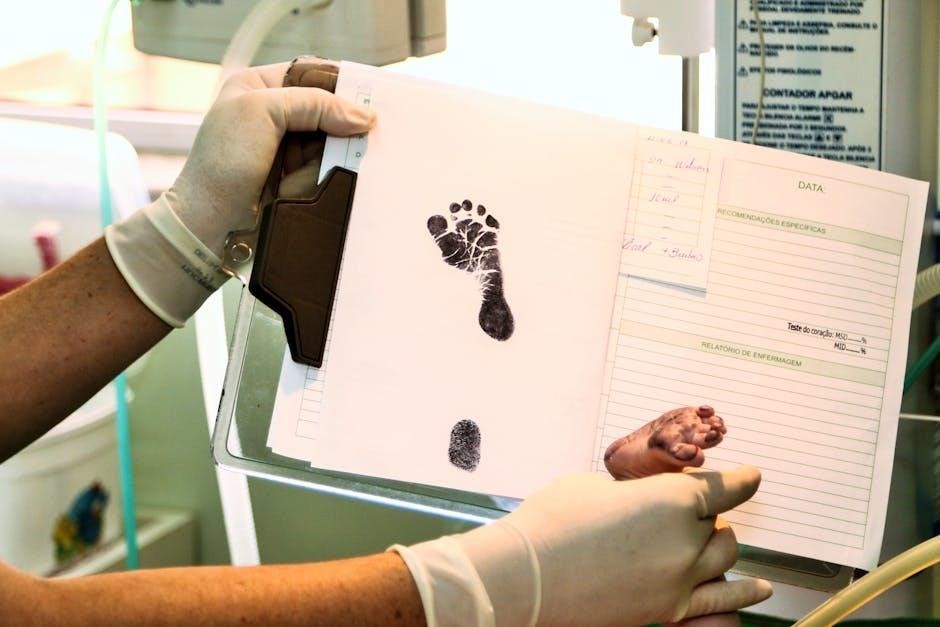
care certificate answers pdf free download
The Care Certificate is an essential qualification for health and social care workers, ensuring high-quality care delivery through standardized training and assessment. It covers 15 key standards, providing a comprehensive foundation for care professionals to understand their roles, develop skills, and deliver person-centered support effectively. The certificate is supported by downloadable resources, including PDF guides and answer banks, which help learners prepare and meet the required competencies confidently.
Overview of the Care Certificate
The Care Certificate is a foundational qualification designed for health and social care workers, particularly those new to the sector. Introduced in 2015 following the Cavendish Review, it aims to ensure consistent, high-quality care by standardizing induction training. The certificate is divided into 15 standards, each addressing a critical aspect of care, such as understanding your role, duty of care, and infection control. While not mandatory, it is highly recommended for care workers to demonstrate their competence and commitment to delivering person-centered support. The certificate is supported by downloadable resources, including PDF workbooks and answer guides, which aid learners in understanding and meeting the required standards effectively. These materials are widely available online, often for free, making it accessible for individuals to prepare and succeed in their care roles.
Importance in Health and Social Care
The Care Certificate plays a vital role in ensuring high-quality care delivery across health and social care settings. By standardizing induction training, it helps care workers understand their responsibilities, promote safety, and deliver person-centered support. The certificate addresses critical areas such as duty of care, safeguarding, and infection control, which are essential for protecting vulnerable individuals. It also fosters a culture of continuous improvement, encouraging workers to reflect on their practices and pursue professional development. Employers benefit from a workforce equipped with consistent skills and knowledge, enhancing service quality and compliance with regulatory standards. Ultimately, the Care Certificate contributes to better outcomes for service users, ensuring dignity, respect, and safe care are prioritized in all interactions. Its widespread adoption has made it a cornerstone of professional development in the care sector.
Structure and Requirements
The Care Certificate is structured around 15 standards, each focusing on a specific aspect of care, such as understanding roles, duty of care, and infection control. These standards ensure care workers develop the necessary skills and knowledge to deliver high-quality, person-centered care. To achieve the certificate, learners must complete both theoretical and practical assessments, demonstrating their ability to apply the standards in real-world scenarios. The requirements include written assignments, workplace observations, and professional discussions, ensuring a comprehensive understanding of care principles. The certificate is typically completed within 12 weeks, though the duration can vary based on individual progress. Employers often use the Care Certificate as part of induction training, ensuring new workers meet the minimum standards for safe and effective care delivery. This structured approach guarantees consistency and competence across the health and social care sector.

Accessing Free Care Certificate Resources
Free Care Certificate resources, including PDF workbooks and answer guides, are available online, supporting learners in understanding and preparing for the 15 standards effectively.
Where to Find Free PDF Downloads
Free Care Certificate PDF downloads, including workbooks and answer guides, are available on trusted websites like Care Skills Training and Skills for Care. These resources provide comprehensive support for learners, covering all 15 standards in detail. Official partners, such as Health Education England, also offer downloadable materials to aid preparation; Websites like Care Skills Training and Skills for Care are reliable sources for high-quality, up-to-date PDF guides. These materials are designed to help care workers understand their roles, develop skills, and deliver person-centered care effectively. By utilizing these free resources, learners can enhance their knowledge and confidence in meeting the Care Certificate standards.
Reliable Websites for Care Certificate Materials
Several trusted websites offer free Care Certificate materials, including PDF downloads, workbooks, and answer guides. Care Skills Training is a top choice, providing comprehensive resources aligned with the 15 Care Certificate standards. Skills for Care and Health Education England also offer reliable materials, ensuring high-quality preparation for care workers. Additionally, websites like Skills for Health provide updated guides and tools to support learning. These platforms are designed to help learners understand their roles, develop essential skills, and deliver person-centered care effectively. By using these reputable sources, care workers can access accurate and relevant information to excel in their training and assessments.

Benefits of Using Free Study Guides

Free study guides for the Care Certificate offer numerous benefits, particularly for those new to health and social care. They provide comprehensive answers to questions across all 15 standards, helping learners identify and address knowledge gaps. These guides are invaluable for self-paced learning, allowing individuals to study at their convenience and reinforce their understanding of key concepts. Additionally, free study guides often include practical examples and real-life scenarios, making complex topics more relatable and easier to grasp. By utilizing these resources, care workers can gain confidence in their abilities, ensuring they deliver high-quality, person-centered care. Moreover, free guides reduce financial barriers, making professional development accessible to everyone. They are an essential tool for anyone aiming to excel in their Care Certificate training and enhance their career prospects in the care sector.

Understanding the 15 Care Certificate Standards
The Care Certificate consists of 15 essential standards, covering key aspects of care, from understanding roles to safeguarding and infection control. These standards provide a framework for delivering high-quality, person-centered care and ensuring the well-being of service users.
Standard 1: Understanding Your Role
Standard 1 of the Care Certificate focuses on understanding your role as a care worker, including your responsibilities, duties, and who you report to. It emphasizes the importance of knowing your job description and how your role contributes to the care team. This standard ensures clarity in your professional boundaries and scope of practice, enabling effective teamwork and high-quality service delivery. By understanding your role, you can integrate seamlessly into the care environment and contribute to the well-being of service users. The Care Certificate workbook and free PDF resources provide detailed guidance to help you grasp this fundamental aspect of care work, ensuring you are well-prepared for your responsibilities and can deliver person-centered support confidently.
Standard 2: Personal Development
Standard 2 of the Care Certificate focuses on personal development, emphasizing the importance of continuous learning and growth in a care role. It encourages care workers to identify their strengths, recognize areas for improvement, and set professional goals. This standard promotes reflection on experiences to enhance skills and knowledge, ensuring high-quality care delivery. By fostering a culture of self-improvement, care workers can adapt to changing demands and deliver person-centered support effectively. The Care Certificate workbook and free PDF resources provide guidance on creating a personal development plan, helping care workers achieve their full potential and contribute positively to their teams and service users.
Standard 3: Duty of Care
Standard 3 of the Care Certificate focuses on the duty of care, which is a legal and moral obligation to ensure the well-being and safety of individuals receiving care. This standard emphasizes the importance of promoting safety, protecting people from harm, and following employer policies and procedures. Care workers must understand their responsibilities in safeguarding service users from abuse, neglect, and injury while respecting their rights and dignity. The duty of care also involves being aware of potential risks and taking appropriate actions to mitigate them. By adhering to this standard, care workers can provide high-quality, ethical care that prioritizes the needs and well-being of those they support. Free PDF resources and answer guides are available to help learners understand and apply this critical aspect of their role effectively.
Standard 4: Equality and Diversity
Standard 4 of the Care Certificate focuses on promoting equality and respecting diversity in care settings. It ensures that care workers understand the importance of providing person-centered care that values and respects everyone’s unique needs, preferences, and backgrounds. This standard emphasizes the need to avoid discrimination and ensure fairness in all interactions. Care workers must recognize and challenge biases, while also respecting individuals’ rights to dignity and autonomy. The standard also highlights the importance of creating an inclusive environment where diversity is celebrated. Free PDF resources and answer guides are available to help learners understand how to apply equality and diversity principles in their daily practice, ensuring high-quality, respectful care for all service users. These materials provide practical examples and guidance to support care workers in meeting this essential standard effectively.
Standard 5: Person-Centred Care
Standard 5 of the Care Certificate focuses on delivering person-centred care, which prioritizes the individual needs, preferences, and values of service users. This standard emphasizes the importance of involving people in decisions about their care, ensuring their autonomy and dignity are respected. Care workers must tailor support to meet unique requirements, fostering a positive and empowering care experience. The standard also highlights the need for effective communication and active listening to understand each person’s wishes and preferences. Free PDF resources and answer guides provide practical examples and strategies to help learners implement person-centred approaches effectively. By mastering this standard, care workers can ensure that care is compassionate, inclusive, and focused on improving the quality of life for all service users, aligning with the core principles of the Care Certificate.
Standard 6: Communication
Standard 6 of the Care Certificate focuses on the importance of effective communication in health and social care settings. Clear and respectful communication is essential for building trust, understanding service users’ needs, and providing high-quality care. This standard covers verbal, non-verbal, written, and electronic communication methods, emphasizing active listening and the need to adapt communication styles to meet individual needs. It also addresses challenges, such as sensory or cognitive impairments, and the importance of using appropriate aids or interpreters. Free PDF resources and answer guides provide examples of effective communication techniques, helping care workers understand how to maintain confidentiality and ensure that service users feel valued and involved in their care. Mastering this standard ensures care workers can communicate effectively, fostering positive relationships and person-centered care delivery.
Standard 7: Privacy and Dignity

Standard 7 of the Care Certificate emphasizes the importance of respecting individuals’ privacy and dignity in all care interactions. This standard ensures that care workers understand the need to maintain confidentiality, protect personal information, and respect individuals’ autonomy. It outlines the importance of creating a safe and comfortable environment where service users feel valued and respected. Key aspects include respecting personal space, ensuring privacy during personal care, and avoiding unnecessary intrusion. Free PDF resources and answer guides provide practical examples of how to uphold privacy and dignity, such as using privacy screens or knocking before entering rooms. These tools help care workers understand how to balance delivering care with maintaining individuals’ self-respect and confidentiality, ensuring person-centered care is prioritized at all times.

Standard 8: Nutrition and Hydration
Standard 8 of the Care Certificate focuses on the crucial role of nutrition and hydration in maintaining the health and well-being of individuals. It emphasizes the importance of providing balanced, nutritious meals and ensuring access to clean drinking water. Care workers are trained to understand the dietary needs of service users, including any specific requirements due to medical conditions or personal preferences. Free PDF resources and answer guides offer practical advice on promoting hydration, assisting with meal times, and handling food safely to prevent contamination. These materials also highlight the need for care workers to encourage independence in eating and drinking, while providing support where necessary. By adhering to this standard, care workers help service users maintain their physical health and overall quality of life through proper nutrition and hydration practices.
Standard 9: Mental Health Conditions
Standard 9 of the Care Certificate focuses on raising awareness about mental health conditions, dementia, and learning disabilities. It equips care workers with the knowledge to understand the experiences and needs of individuals with these conditions. Free PDF resources and study guides provide detailed answers and examples to help learners grasp the complexities of mental health care. These materials emphasize the importance of person-centered approaches, empathy, and effective communication when supporting individuals with mental health challenges. By completing this standard, care workers gain the skills to deliver compassionate and informed care, ensuring they can meet the unique needs of service users with mental health conditions. The resources also cover strategies for promoting mental well-being and respecting individual preferences and boundaries.
Standard 10: Dementia and Learning Disabilities
Standard 10 of the Care Certificate focuses on understanding and supporting individuals with dementia and learning disabilities. It emphasizes the importance of person-centered care, tailored to meet the unique needs of each individual. Free PDF resources and study guides provide detailed answers and strategies for effective communication and support. These materials highlight the need for patience, empathy, and adaptability when interacting with individuals who may have cognitive or intellectual challenges. The standard also covers practical approaches to creating a supportive environment and promoting independence. By completing this standard, care workers gain the knowledge and skills to deliver compassionate and inclusive care, ensuring individuals with dementia and learning disabilities receive the respect and support they deserve. The resources aim to enhance understanding and confidence in providing high-quality care tailored to specific needs.
Standard 11: Safeguarding Adults
Standard 11 of the Care Certificate focuses on safeguarding adults, ensuring their right to live safely, free from abuse, neglect, and exploitation. It emphasizes the importance of recognizing signs of harm, understanding legal frameworks like the Care Act 2014, and knowing how to report concerns. Free PDF resources and study guides provide detailed answers and scenarios to help care workers understand their role in safeguarding. These materials outline practical steps for identifying risks, responding appropriately, and collaborating with other professionals to protect vulnerable adults. The standard also highlights the need for confidentiality and respecting individuals’ rights while ensuring their safety. By mastering this standard, care workers can contribute to creating a secure and supportive environment for adults in their care, aligning with legal and ethical best practices. The resources aim to equip workers with the confidence and knowledge to safeguard adults effectively.
Standard 12: Safeguarding Children
Standard 12 of the Care Certificate focuses on safeguarding children, ensuring their protection from harm, abuse, and neglect. It equips care workers with the knowledge to recognize signs of potential abuse, understand legal responsibilities, and take appropriate actions to safeguard children. Free PDF resources and study guides provide detailed answers and scenarios to help care workers grasp their role in child protection. These materials emphasize the importance of collaboration with parents, carers, and other professionals to ensure children’s well-being. The standard also covers procedures for reporting concerns and supporting children in a safe and respectful manner. By mastering this standard, care workers can confidently contribute to creating a protective environment for children, aligning with legal and ethical best practices. The resources aim to enhance understanding and practical application of safeguarding principles in real-world scenarios.
Standard 13: Basic Life Support
Standard 13 of the Care Certificate focuses on basic life support, equipping care workers with essential skills to respond to life-threatening emergencies. It covers cardiopulmonary resuscitation (CPR), the use of automated external defibrillators (AEDs), and other critical interventions. Free PDF resources and answer guides provide detailed explanations and practical scenarios to help learners master these techniques. The standard emphasizes the importance of prompt and effective action to maintain circulation and breathing until professional medical help arrives. By understanding and applying these skills, care workers can make a significant difference in emergency situations, improving outcomes for individuals in need; The resources also highlight the legal and ethical considerations surrounding basic life support, ensuring care workers are both competent and confident in their ability to act appropriately. These materials are indispensable for anyone preparing to meet the requirements of this standard.
Standard 14: Health and Safety
Standard 14 of the Care Certificate emphasizes the importance of maintaining a safe environment for both care workers and service users. It covers essential health and safety practices, including risk assessments, infection control, and the proper use of personal protective equipment (PPE). Free downloadable PDF guides and answer banks provide comprehensive insights into legal requirements and organizational policies, ensuring compliance with regulations. Topics such as hazard identification, accident prevention, and emergency procedures are thoroughly explored, offering practical examples and scenarios. These resources are designed to help care workers develop a proactive approach to safety, reducing risks and fostering a culture of well-being. By mastering this standard, care professionals can contribute to a secure and healthy care setting, benefiting both themselves and those they support.
Standard 15: Infection Prevention and Control
Standard 15 of the Care Certificate focuses on preventing and controlling infections to protect both service users and care workers. It emphasizes the importance of hygiene practices, such as hand washing, using personal protective equipment (PPE), and following proper cleaning and disinfection procedures. The standard also covers how to identify and report infection risks, ensuring a safe care environment. Free downloadable PDF guides and answer banks provide detailed guidance on these topics, offering practical examples and scenarios to help learners understand and apply infection control measures effectively. By mastering this standard, care workers can significantly reduce the spread of infections, safeguarding the health and well-being of everyone involved in care settings. These resources are invaluable for ensuring compliance with infection control policies and procedures.

Downloading and Utilizing the Resources
Accessing free Care Certificate resources, such as PDF guides and answer banks, simplifies learning and exam preparation. These materials provide clear instructions and examples to help users effectively utilize the resources.
Step-by-Step Guide to Downloading the PDF

To download the Care Certificate answers PDF, visit a trusted website such as Care Skills Training or Skills for Care. Navigate to the resources section and select the desired standard. Click the download link, choose the PDF format, and save it to your device. Ensure you have a PDF reader installed to access the content. These guides are designed to aid in understanding and preparing for the Care Certificate, offering comprehensive answers and study materials for all 15 standards. Utilize these resources to enhance your learning and confidently complete the certification process.
Effectively Using the Answer Guide
Using the Care Certificate answer guide effectively involves reviewing each standard thoroughly and cross-referencing with the workbook. Start by identifying areas where you need improvement, focusing on the answers provided to fill knowledge gaps. Engage in active learning by applying the answers to real-life scenarios, enhancing your understanding of care practices. Regularly test yourself using the guide to reinforce learning and build confidence. Additionally, use the guide to prepare for assessments by practicing with sample questions and ensuring familiarity with the expected formats. By integrating the answer guide into your study routine, you can achieve a deeper understanding of the Care Certificate standards and excel in your role as a care professional.
Mastering the Care Certificate requires dedication and the right resources. The workbook and answer guides provide a clear path to understanding each standard, ensuring effective care delivery. This qualification is a cornerstone for a successful and fulfilling career in health and social care, equipping you with the knowledge and confidence to make a positive impact.
Final Thoughts on the Care Certificate
The Care Certificate is a vital foundation for anyone entering the health and social care sector, ensuring high-quality, person-centered support. By completing the 15 standards, learners gain the essential skills and knowledge needed to deliver compassionate and effective care. The availability of free PDF resources, including workbooks and answer guides, makes preparation accessible and efficient. These tools not only bridge learning gaps but also build confidence, enabling care workers to excel in their roles. Encouraging continuous professional development, the Care Certificate fosters a culture of excellence in care delivery, benefiting both professionals and service users alike. Embrace these resources to enhance your understanding and advance your career in this rewarding field.

Encouragement for Further Study
Completing the Care Certificate is a significant achievement, but it’s just the beginning of your learning journey. Encouraging further study allows you to deepen your expertise and stay updated on best practices in health and social care. Consider exploring specialized courses, such as dementia care, mental health support, or leadership skills, to advance your career. Utilize free resources like PDF guides and study materials to continue building your knowledge. Engaging in ongoing professional development not only enhances your skills but also demonstrates your commitment to delivering high-quality care. By embracing lifelong learning, you can grow into a confident, competent, and compassionate care professional, making a meaningful difference in the lives of those you support.


Leave a Reply
You must be logged in to post a comment.